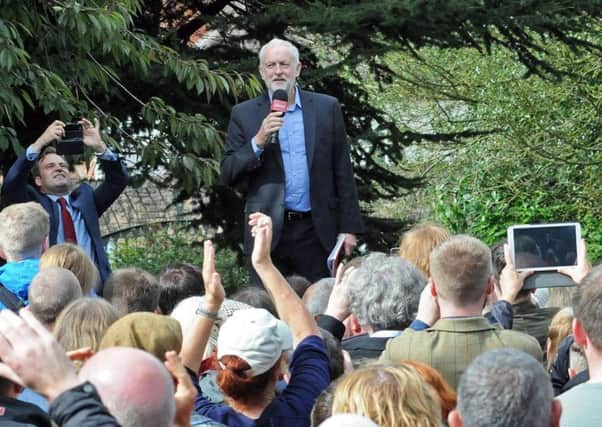Matthew Flinders: Jeremy Corbyn failing leadership test over anti-Semitism


The apparent inability or unwillingness of Jeremy Corbyn to take a clear and definite position on a whole range of topics made me think of ‘being nothing’ and ‘the art of nothingness’ almost as a form of political statecraft – be as vague as you can be on as many issues as possible in order to avoid the unavoidable flack that comes with taking a decision or adopting a position.
Let me also be clear: I am not a specialist in the history of analysis of anti-Semitism. But I am aware that Sartre’s next book Anti-Semite and Jew was written shortly after the liberation of Paris from German occupation in 1944.
Advertisement
Hide AdAdvertisement
Hide AdIt sought to explain the roots of hate through a focus on anti-Semitism. The main idea was that the ‘anti-Semite’ was a largely homogenous and identifiable group or strata in society (bourgeoisie, reactionary, uncomfortable in the modern world) that attributed all of their misfortunes and perceived threats to the presence of Jewish people and through this thought process divested themselves of responsibility for failure or fate. Anti-Semitism was not therefore based on evidence and experience but a deep-seated emotional construct: a negative passion in the form of hatred.
George Orwell was not impressed. “I think Sartre is a bag of wind,” he wrote to his publisher, “and I’m going to give him a big boot”. In Antisemitism in Britain (1945) Orwell suggested that anti-Semitism was not confined to any one identifiable social strata and was in fact to be found within all classes.
Put slightly differently, it was a shared problem and the starting point for any investigation should not start with ‘them’ but with ‘me’. “The point is that something, some psychological vitamin, is lacking in modern civilisation,” Orwell wrote, “and as a result we are all more or less subject to this lunacy of believing that whole races or nations are mysteriously good or mysteriously evil. I defy any modern intellectual to look closely and honestly into his own mind without coming upon nationalistic loyalties and hatreds of one kind or another.”
The point that Orwell was making – and which brings me back to Jeremy Corbyn and the problem of nothingness – is that anti-Semitism is an issue that demands more than half-hearted letters of apology or new disciplinary frameworks. It demands open reflection, a vision for the future and, most of all, political leadership.
And leadership appears to be what is lacking.
Advertisement
Hide AdAdvertisement
Hide AdFrom bursting onto the political stage and leading the Labour Party to a glorious defeat in 2017 Jeremy Corbyn seems to have spent 2018 as the ‘Where’s Wally?’ of Westminster. The striped jumper and glasses may have been replaced with the grandfatherly beard, cardigan and bicycle clips but the general sense of absence and anonymity is almost palpable. This has been particularly obvious in relation to Labour’s stance on Brexit and came to a head last month when a large number of frustrated anti-Brexit activists chanted ‘Where’s Jeremy Corbyn?’ as they marched on Westminster.
Nothingness as a political strategy clearly has its benefits. With Theresa May skewered from all sides, saying nothing on as many issues as possible and waiting for the Government to implode might appear rational for the official Opposition. But it’s not good enough for a country that urgently requires fresh ideas and bold thinking. Which brings me (strangely) back to Sartre.
Sartre’s 1944 play No Exit was not a premonition (or prediction) of the United Kingdom’s current constitutional crisis but a treatise on the existence of hell. Many in the Labour Party now feel themselves trapped within the political equivalent of a Sartre play. Many other people just feel trapped in a world that appears defined by increasing insecurity and growing inequality. This is a time in which the Labour Party should have most to offer the British public but it generally appears divided, hesitant, lacking in leadership, unsure of where it is going or why. That’s the problem of nothingness.
It was probably for exactly this reason that Sartre concluded his Being and Nothingness with a section entitled ‘Having, Doing and Being’. Could this be a leitmotif for Jeremy Corbyn to reflect upon over what remains of the summer?
Professor Matthew Flinders is a lecturer in the Department of Politics and Sir Bernard Crick Centre for the Public Understanding of Politics at the University of Sheffield